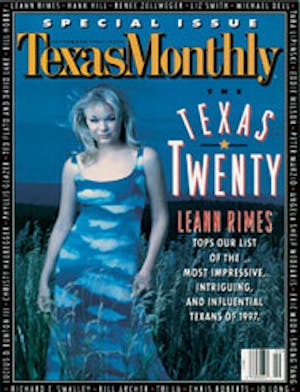IT IS NOT EVERY DAY that you check your answering machine and discover a message inviting you to become the chancellor of a university, even if your name is Bill Hobby. “My first reaction was, There’s something wrong with this machine,’” the 65-year-old Hobby recalled one day this summer about the offer he received two years ago. Instead, there was something wrong with the University of Houston. Its main campus had gone through three presidents in six years, its senior management was in disarray, its enrollment was declining, and its faculty was in revolt over the size of the severance packages awarded to departing administrators. U of H desperately needed an immediate infusion of prestige and credibility.
Hobby fit the job description. His father, William P. Hobby, Sr., had been governor of Texas; his mother, Oveta Culp Hobby, was a Cabinet Secretary (she ran the Department of Health, Education, and Welfare for Dwight Eisenhower). A Houston airport bears the family name and so will the city’s new performing arts center. Most of Hobby’s own career had been spent in public service. He held the office of lieutenant governor for eighteen years (19731991), longer by far than anyone else, and his principal cause was adequate funding for the state’s colleges and universities, which prospered on his watch as never before. He has done about everything for higher education that you could ask of a person. He has served on a governing board (at Rice University, his alma mater), taught (at Rice and the Lyndon B. Johnson School of Public Affairs at the University of Texas at Austin), and through a family foundation, donated money (for the new Hobby-Eberly telescope at UT’s McDonald Observatory). Save a university? Why not?
“The University of Houston had never been at the table when decisions about higher education were made at the Legislature,” Hobby remembered, pulling down a copy of an old state budget from a nearby shelf in his LBJ School office. “I thought I could help that.” He told the regents that he would serve as chancellor, without pay, for two years or less, if he could find a worthy successor. One of his first acts was to include faculty representatives in policy meetings, overruling administrators who said, in effect, “You can’t do that.” He lobbied legislative leaders to ensure funding for U of H’s Texas Center for Superconductivity. Last fall Hobby found the successor he was looking for Arthur Smith, the highly regarded president of the University of Utah, who accepted the newly combined position of chancellor and president and in April he stepped down, having restored the university to respectability.
What makes Hobby so formidable is his instinct for doing the right thing for the right reason and his insistence that those around him do likewise. He operated at U of H just as he had as the leader of the Texas Senate. To get ahead in Hobby’s Senate, you had to be willing to address the state’s major problems without partisanship or demagoguery, and you had to obey his number one rule: Never embarrass the Senate. Hobby set the standard and rewarded those who met it with his respect. Those who didn’t meet it were not left in doubt about where they stood. One who didn’t get Hobby’s approval was Governor Bill Clements. His plan for coping with shrinking oil revenues in the late eighties was to insist on deep budget cuts. Hobby’s was to invest more in education. The two men viewed each other with the total disdain that only Old Money and New Money can have for each other, but in the end, Old Money won and Hobby had his way.
Someone meeting Hobby for the first time wouldn’t peg him as a leader. He doesn’t have the personality of a CEO, and he’s not the type of man who dominates a room. He speaks softly and studies the table in front of him while he talks. He’s not the dress-for-success sort either. Indifferent to wrinkles and rumples, he has a predilection for ill-fitting pants and clunky shoes. He sports a scraggy salt-and-pepper beard and wears a simple Casio watch with a plastic band. He reminds me of my freshman math professor.
Indeed, within Bill Hobby lies a frustrated mathematician. An unhappy encounter with differential equations as a sophomore at Rice denied him a career in algorithms, approximation theory, error analysis, and complex nonlinear systems of equations, but he is trying to make up for lost time. He has spent the past six summers taking statistics courses as a visiting scholar at the University of Michigan. This spring, at ceremonies in France honoring a University of Houston mathematician, he delivered a speech titled “Scientific Computation for the 10101st Century: Conference in Honor of Professor Roland Glowinski on His 111100th Birthday.” That’s sixtieth. I asked. “The numbers are in binary form,” Hobby told me as proudly as if he were showing me pictures of the grandkids. “I got the idea from the cornerstone of the computer science center at Rice.”
Ask Hobby about almost any subject and the conversation can veer suddenly to math. College funding? “I’m just commencing a six-year term on the Formula Advisory Committee to the [Texas Higher Education] Coordinating Board,” he said. “I’d like to smooth out the matrix a bit.” The trouble with politics today? He grabbed a piece of paper and started sketching a graph, two mountains that overlapped in a shaded area. “It’s the diminishing middle. Here, look at this frequency distribution.” He finished his graph and looked upa happy man who had already overcome the disappointment of losing his bid to be dean of the LBJ School. He has been president of the family-owned Houston Post, the second-highest public official in Texas, and the head of a major university but only now has found his true calling. “I love to crunch numbers,” he said.
- More About:
- Higher Education
- Houston







